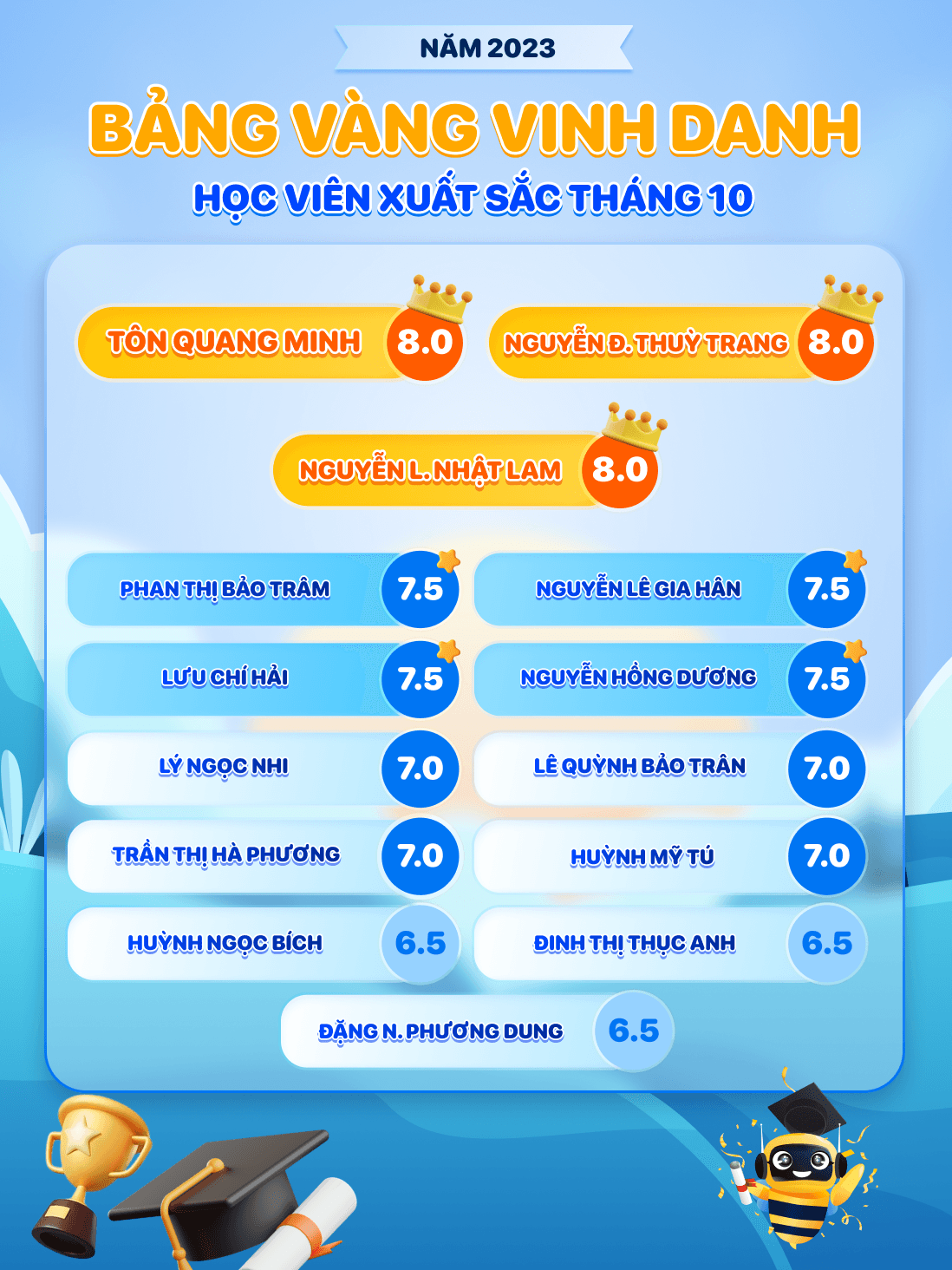Bổ sung vốn từ vựng theo chủ đề là một trong những bước đệm vô cùng quan trọng giúp thí sinh đạt điểm cao trong quá trình làm bài thi IELTS, đặc biệt là IELTS Writing và Speaking. Bài viết dưới đây PREP xin chia sẻ tới Preppies bộ từ vựng chủ đề Culture (Văn hóa) cơ bản và nâng cao trong tiếng Anh. Cùng trau dồi từ vựng ngay hôm nay nhé!
Từ vựng chủ đề Culture (Văn hóa) thông dụng trong tiếng Anh I. Một số từ vựng chủ đề Culture nâng cao 1. Từ vựng chủ đề Culture: Danh từ Trong bảng dưới đây, prepedu.com sẽ tổng hợp một số từ vựng chủ đề Culture dưới dạng danh từ
Từ vựng chủ đề Culture Phát âm Ý nghĩa Ví dụ Culture /kʌltʃə/r/ Văn hóa I love working abroad and meeting people from different cultures .
Tôi thích làm việc ở nước ngoài và gặp gỡ mọi người từ các nền văn hóa khác nhau.
Cultural assimilation /kʌltʃərəl əˌsɪməˈleɪʃn/ Sự đồng hóa về văn hóa The teaching of ex-colonial languages in Africa has tended toward linguistic and cultural assimilation .
Việc giảng dạy các ngôn ngữ ngoài thuộc địa ở Châu Phi có xu hướng đồng hóa ngôn ngữ và văn hóa.
Cultural exchange /kʌltʃərəl ɪksˈtʃeɪndʒ/ Trao đổi văn hóa A school trip to another country is an example of cultural exchange in a school context.
Một chuyến đi học đến một quốc gia khác là một ví dụ về trao đổi văn hóa trong bối cảnh học đường.
Cultural diversity /kʌltʃərəl daɪˈvɜːsəti/ Sự đa dạng văn hóa The world's cultural diversity is rapidly declining.
Sự đa dạng văn hóa của thế giới đang suy giảm nhanh chóng.
Cultural festival /kʌltʃərəl ˈfestɪvl/ Lễ hội văn hóa The Ethnic Culture Festival is held once a year.
Ngày hội Văn hóa các dân tộc được tổ chức mỗi năm một lần.
Cultural heritage /kʌltʃərəl ˈherɪtɪdʒ/ Di sản văn hoá Cultural heritage enriches the lives of people.
Di sản văn hóa làm phong phú cuộc sống của người dân.
Cultural integration /kʌltʃərəl ˌɪntɪˈɡreɪʃn/ Hội nhập văn hóa Vietnam became a member of the ASEAN Community on December 31st, 2015. This creates a chance for Vietnam to further promote cultural integration and its cultural identity.
Việt Nam trở thành thành viên của Cộng đồng ASEAN vào ngày 31 tháng 12 năm 2015. Đây là cơ hội để Việt Nam tiếp tục đẩy mạnh hội nhập văn hóa và bản sắc văn hóa của mình.
Cultural misconception /kʌltʃərəl ˌmɪskənˈsepʃn/ Hiểu lầm về văn hóa Cultural misconceptions often lead to unequal treatment.
Những quan niệm sai lầm về văn hóa thường dẫn đến sự đối xử bất bình đẳng.
Unique culture /juːˈniːk ˈkʌl.tʃɚ// Nét độc đáo trong văn hóa Bali, in particular, is known worldwide as a beautiful island featuring its own unique culture .
Đặc biệt, Bali được cả thế giới biết đến là một hòn đảo xinh đẹp với nền văn hóa độc đáo của riêng mình.
Culture shock /kʌltʃə/r/ ʃɒk/ Sốc văn hóa She experienced great culture shock when she first came to Europe.
Cô ấy đã trải qua cú sốc văn hóa lớn khi lần đầu tiên đến Châu Âu.
Folk culture /fəʊk ˈkʌltʃər/ Văn hóa dân gian Folk culture can also be expressed as craftsmanship versus factory work.
Văn hóa dân gian cũng có thể được thể hiện như nghề thủ công so với công việc nhà máy.
Cultural conflict /kʌltʃərəl ˈkɒnflɪkt/ Xung đột văn hóa Cultural conflicts are difficult to resolve as parties to the conflict have different beliefs.
Xung đột văn hóa rất khó giải quyết vì các bên xung đột có niềm tin khác nhau.
Intangible Cultural Heritage of Humanity /ɪnˈtændʒəbl ˈkʌltʃərəl ˈherɪtɪdʒ əv hjuːˈmænəti/ Di sản văn hóa phi vật thể của nhân loại Nha Nhac - Vietnamese court music was inscribed on the Representative List of the Intangible Cultural Heritage of Humanity in 2008.
Nhã nhạc - Nhã nhạc cung đình Việt Nam được ghi vào Danh sách di sản văn hóa phi vật thể đại diện của nhân loại năm 2008.
Cultural degradation /kʌltʃərəl ˌdeɡ.rəˈdeɪ.ʃən/ Sự xói mòn về mặt văn hoá The risk of national cultural degradation is greater in developing countries than in developed countries.
Nguy cơ xói mòn về mặt văn hoá dân tộc ở các nước đang phát triển lớn hơn ở các nước phát triển.
Deep-rooted culture / diːp-'ruːtid 'kʌltʃər/ Văn hoá bám sâu vào cội rễ For millennials, deep-rooted culture will sustain.
Trong nhiều thiên niên kỷ, nền văn hoá bám sâu vào cội rễ sẽ bền vững.
Value /ˈvæljuː/ Giá trị Vietnamese culture has a long-standing value .
Văn hóa Việt Nam có giá trị lâu đời.
Behavior /bɪˈheɪvjər/ Hành vi Fighting during a collision is a behavior that affects public culture.
Đánh nhau khi va chạm là hành vi ảnh hưởng đến văn hóa nơi công cộng.
Belief /bɪˈliːf/ Niềm tin, đức tin Belief is an essential element in workplace relationships.
Niềm tin là yếu tố cần thiết trong các mối quan hệ nơi công sở.
Minority group /maɪˈnɒrəti ɡruːp/ Dân tộc thiểu số Minority groups make up a small proportion of the population but are the keepers of a unique traditional national identity.
Các nhóm dân tộc thiểu số chiếm một tỷ lệ dân số nhỏ nhưng là những người lưu giữ bản sắc truyền thống độc đáo của dân tộc.
Majority group /məˈdʒɒrəti ɡruːp/ Dân tộc đa số The majority group is the ethnic group whose population accounts for more than 50% of the country's total population.
Dân tộc đa số là dân tộc có số dân chiếm trên 50% tổng dân số cả nước.
Emigrant /ˈemɪɡrənt/ Người di cư Millions of European emigrants came to America in the 19th century.
Hàng triệu người châu Âu di cư đã đến Mỹ trong thế kỷ 19.
Immigrant /ˈɪmɪɡrənt/ Người nhập cư Millions of immigrants came to America from Europe in the 19th century.
Hàng triệu người nhập cư đến Mỹ từ châu Âu trong thế kỷ 19.
Stereotype /ˈsteriətaɪp/ Khuôn mẫu She was the very stereotype of the prim English woman.
Cô ấy là khuôn mẫu của người phụ nữ Anh nguyên thủy.
Ritual /rɪtʃul/ Lễ nghi The priest will perform the ritual .
Thầy cúng sẽ thực hiện nghi lễ.
Ancient monument /eɪnʃənt ˈmɒnjumənt/ Di tích cổ Royal Tomb at Hue is an ancient monument of Vietnam.
Lăng tẩm Huế là một di tích cổ của Việt Nam.
Civilization /sɪvəlaɪˈzeɪʃn/ Nền văn minh They spent a week visiting the wonders of Ancient Greek civilization .
Họ đã dành một tuần để tham quan những kỳ quan của nền văn minh Hy Lạp cổ đại.
Historic site /hɪˈstɒrɪk saɪt/ Di tích lịch sử Co Loa Citadel is a historic site that covers more than 830 hectares.
Thành Cổ Loa là khu di tích lịch sử rộng hơn 830 ha.
Wonder /wʌndər/ Kỳ quan The Great Wall of China is a wonder of the world.
Vạn Lý Trường Thành của Trung Quốc là một kỳ quan của thế giới.
National identity /næʃnəl aɪˈdentəti/ Bản sắc dân tộc National identity is expressed in passionate patriotism.
Bản sắc dân tộc thể hiện ở lòng yêu nước nồng nàn.
Race conflict /reɪs ˈkɒnflɪkt/ Xung đột sắc tộc The early 1920s were a period of chronic and intense class and racial conflict .
Đầu những năm 1920 là thời kỳ xung đột giai cấp và chủng tộc gay gắt và dai dẳng.
Racism /reɪsɪzəm/ Chủ nghĩa phân biệt chủng tộc The authorities are taking steps to tackle racism in schools.
Các nhà chức trách đang thực hiện các bước để chống lại nạn phân biệt chủng tộc trong trường học.
Từ vựng chủ đề Culture: Danh từ
2. Từ vựng chủ đề Culture: Động từ Có những động từ
Từ vựng chủ đề Culture Phát âm Ý nghĩa Ví dụ Discriminate (against sb) /dɪˈskrɪmɪneɪt/ Phân biệt đối xử (với ai) She felt she had been discriminated against because of her age.
Cô cảm thấy mình bị phân biệt đối xử vì tuổi tác.
Integrate /ɪntɪɡreɪt/ Hội nhập It's very difficult to integrate yourself into a society whose culture is so different from your own.
Rất khó để hội nhập bản thân vào một xã hội có nền văn hóa quá khác biệt với nền văn hóa của bạn.
Respect cultures /rɪˈspekt ˈkʌltʃər/ Tôn trọng các nền văn hóa The students in my school are taught to respect different cultures .
Học sinh ở trường học của tôi được dạy phải tôn trọng các nền văn hóa khác nhau.
Từ vựng chủ đề Culture: Động từ
3. Từ vựng chủ đề Culture: Tính từ Một số tính từ
Từ vựng chủ đề Culture Phát âm Ý nghĩa Ví dụ Imbued with national identity /ɪmˈbjuː wɪð ˈnæʃ.nəl aɪˈden.tə.ti/ Đậm đà bản sắc dân tộc Viet Nam is a beautiful country possessing a culture imbued with national identity .
Việt Nam là đất nước tươi đẹp, có nền văn hóa đậm đà bản sắc dân tộc.
Well-preserved /ˌwel prɪˈzɜːvd/ Được bảo tồn tốt The site is well-preserved thanks to a community-based management program.
Khu vực này được bảo tồn tốt nhờ vào chương trình quản lý dựa vào cộng đồng.
Cultural specific /kʌltʃərəl ˌspesɪˈfɪk/ Đặc trưng văn hóa What education level do they have? Any cultural specifics ?
Họ có trình độ học vấn nào? Bất kỳ chi tiết đặc trưng văn hóa cụ thể nào?
Từ vựng chủ đề Culture: Tính từ
II. Từ vựng chủ đề Culture - Văn hóa Việt Nam Văn hóa Việt Nam là những gì phục vụ cho đời sống tinh thần, thuộc đời sống tinh thần của người Việt Nam. Cùng PREP tìm hiểu từ vựng chủ đề Culture về tên các địa danh cũng như các phong tục văn hóa bạn nhé!
1. Tên các địa danh văn hóa Việt Nam Lưu ngay vào sổ tay một số từ vựng chủ đề Culture chỉ tên các địa danh văn hóa nổi bật của Việt Nam bạn nhé!
Từ vựng chủ đề Culture Phiên âm Tiếng Việt Ví dụ Pagoda of the Heavenly Lady (n)pəˈgəʊdə ɒv ðə ˈhɛvnli ˈleɪdi Chùa Thiên Mụ Pagoda of the Heavenly Lady is the earliest pagoda built in Hue City.
Chùa Thiên Mụ là ngôi chùa được xây dựng sớm nhất ở Huế.
The Ambassadors’ Pagoda (n)ði æmˈbæsədəz pəˈgəʊdə Chùa Quán Sứ The Ambassadors’ Pagoda in Hanoi was founded in the 15th century.
Chùa Quán Sứ ở Hà Nội được thành lập vào thế kỷ 15.
The ancient capital of the Nguyen Dynasty (n)ði ˈeɪnʃ(ə)nt ˈkæpɪtl ɒv ðə Nguyen ˈdɪnəsti Cố đô triều Nguyễn The ancient capital of the Nguyen Dynasty was the last feudal dynasty in the history of Vietnam.
Cố đô của nhà Nguyễn là triều đại phong kiến cuối cùng trong lịch sử Việt Nam.
The Ben Thanh market (n)ðə bɛn Thanh ˈmɑːkɪt Chợ Bến Thành Ben Thanh Market is a large market located in the center of Ho Chi Minh City.
Chợ Bến Thành là một ngôi chợ lớn nằm ở trung tâm thành phố Hồ Chí Minh.
The Lenin park (n)ðə ˈlɛnɪn pɑːk Công viên Lênin The Lenin Park is located opposite the Vietnam Military History Museum in Hanoi.
Công viên Lênin nằm đối diện Bảo tàng Lịch sử Quân sự Việt Nam tại Hà Nội.
The Museum of Fine Arts (n)ðə mju(ː)ˈzɪəm ɒv faɪn ɑːts Bảo tàng Mỹ thuật The Museum of Fine Arts is a place to display and store national artworks.
Bảo tàng Mỹ thuật là nơi trưng bày và lưu giữ các tác phẩm nghệ thuật dân tộc.
The Museum of History (n)ðə mju(ː)ˈzɪəm ɒv ˈhɪstəri Bảo tàng Lịch sử The Museum of History at 216 Tran Quang Khai is a place to store artifacts and historical documents of Vietnam from the mid-19th century.
Bảo tàng Lịch sử tại 216 Trần Quang Khải là nơi lưu giữ những hiện vật, tư liệu lịch sử của Việt Nam từ giữa thế kỷ 19.
The Museum of the Army (n)ðə mju(ː)ˈzɪəm ɒv ði ˈɑːmi Bảo tàng Quân đội The Museum of the Army is one of six Vietnam national museums.
Bảo tàng Quân đội là một trong sáu bảo tàng quốc gia của Việt Nam.
The Museum of the Revolution (n)ðə mju(ː)ˈzɪəm ɒv ðə ˌrɛvəˈluːʃən Bảo tàng Cách mạng The Museum of the Revolution is a school of revolutionary spirit and revolutionary struggle.
Bảo tàng Cách mạng là trường học về tinh thần cách mạng và đấu tranh cách mạng.
The One Pillar pagoda (n)ðə wʌn ˈpɪlə pəˈgəʊdə Chùa Một Cột The One Pillar pagoda is one of the most unique architectural temples in Asia.
Chùa Một Cột là một trong những ngôi chùa có kiến trúc độc đáo nhất Châu Á.
The Perfume Pagoda (n)ðə ˈpɜːfjuːm pəˈgəʊdə Chùa Hương The Perfume Pagoda is a famous tourist destination in Hanoi.
Chùa Hương là một địa điểm du lịch nổi tiếng ở Hà Nội.
The portico of the pagoda (n)ðə ˈpɔːtɪkəʊ ɒv ðə pəˈgəʊdə Cổng chùa Stone porticos of the pagoda are increasingly popular in temples in Vietnamese villages.
Cổng chùa bằng đá ngày càng phổ biến ở các ngôi chùa ở làng quê Việt Nam.
The Reunification Railway (n)ðə ˌriːˌjuːnɪfɪˈkeɪʃən ˈreɪlweɪ Đường sắt Thống Nhất The Reunification Railway is a railway line starting from Hanoi's capital and ending in Ho Chi Minh City.
Đường sắt Thống Nhất là tuyến đường sắt bắt đầu từ thủ đô Hà Nội và kết thúc tại Thành phố Hồ Chí Minh.
The Royal City (n)ðə ˈrɔɪəl ˈsɪti Đại nội The Hue's Royal City is imbued with the culture, history, and architecture of the Nguyen Dynasty.
Đại nội Huế mang đậm dấu ấn văn hóa, lịch sử và kiến trúc của triều Nguyễn.
The Royal Palace (n)ðə ˈrɔɪəl ˈpælɪs Cung điện An Dinh is a royal palace built by King Khai Dinh in 1917.
An Định là cung điện được vua Khải Định cho xây dựng năm 1917.
The Saigon port (n)ðə Saigon pɔːt Cảng Sài Gòn The Saigon Port is an international port, the main port of the South.
Cảng Sài Gòn là cảng quốc tế, cảng chính của miền Nam.
The thirty-six streets of old Hanoi (n)ðə ˈθɜːti-sɪks striːts ɒv əʊld hæˈnɔɪ Ba mươi sáu phố phường Hà Nội cổ Hang Bac, Hang Gai, Hang Bo,... is on of street of the thirty-six streets of old Hanoi.
Hàng Bạc, Hàng Gai, Hàng Bồ,... là một trong những con phố của 36 phố phường Hà Nội xưa.
Từ vựng chủ đề Culture: Tên các địa danh văn hóa Việt Nam
2. Các phong tục văn hóa Việt Nam Việt Nam có những phong tục văn hóa nào nổi bật? Những phong tục này trong tiếng Anh được gọi tên như thế nào? Cùng PREP tìm hiểu từ vựng chủ đề Culture này nhé!
Từ vựng chủ đề Culture Phiên âm Tiếng Việt Ví dụ Betel chewing /ˈbiː.t̬əl /tʃuːing/ Tục ăn trầu A thousand-year-old tradition of betel chewing constitutes an important and popular cultural activity in Vietnam.
Truyền thống ăn trầu hàng nghìn năm tuổi là một hoạt động văn hóa quan trọng và phổ biến ở Việt Nam.
Lunar new year /ˌluːnɚ ˈnuː ˌjɪr/ Tết Nguyên Đán Vietnam is preparing for next month's Lunar New Year holiday, known as Tet.
Việt Nam đang chuẩn bị cho kỳ nghỉ Tết Nguyên đán vào tháng tới, được gọi là Tết.
Qingming Festival /quingming ˈfes.tə.vəl/ Tết Thanh Minh Qingming Festival is one of the most important traditional festivals in Vietnam. It falls on April 4th or 5th.
Lễ hội Qingming là một trong những lễ hội truyền thống quan trọng nhất ở Việt Nam. Nó rơi vào ngày 4 hoặc 5 tháng 4.
Mid-autumn festival /mɪd ˈɔːtəm ˈfes.tə.vəl/ Tết Trung Thu Children parade lanterns in the streets the night of the Mid-autumn Festival to help light the way to Earth for Cuội from the moon.
Trẻ em diễu hành đèn lồng trên đường phố vào đêm Trung thu để giúp thắp sáng con đường cho Cuội từ mặt trăng.
Hung Temple Festival /ˈtɛmpəl ˈfɛstəvəl/ Lễ hội Đền Hùng Hung Temple Festival is one of the most important cultural events in the Vietnamese nation.
Lễ hội Đền Hùng là một trong những sự kiện văn hóa quan trọng nhất của dân tộc Việt Nam.
Giong Festival /giong ˈfɛstəvəl/ Lễ hội đền Gióng Giong Festival is a festival that is held annually in many places in Viet Nam to commemorate and praise the deeds of Saint Giong.
Hội Gióng là một lễ hội được tổ chức hàng năm ở nhiều nơi trên Việt Nam để tưởng nhớ và ca ngợi những chiến công của Thánh Gióng.
Ba Chua Xu Festival /ba chua xu ˈfɛstəvəl/ Lễ hội Bà Chúa Xứ Ba Chua Xu Festival starts from at night of April 23 to 27 of the lunar calendar.
Lễ hội Bà Chúa Xứ bắt đầu từ đêm 23 đến 27 tháng 4 âm lịch.
III. Bài mẫu IELTS Writing có sử dụng từ vựng chủ đề culture Dưới đây là một số bài mẫu IELTS Writing band 7.0-8.0 được viết bởi thầy Tú Phạm. Hãy cùng xem cách thầy áp dụng từ vựng chủ đề Culture vào trong bài làm và cách viết những đoạn văn theo chủ đề như nào nhé!
1. Đề bài IELTS Writing Task 2 International tourism Đề bài IELTS Writing Task 2: Many people believe that international tourism is a bad thing for their country. What are the reasons? Solutions to change negative attitudes?
A hostile attitude towards the trend of international tourism has emerged amongst local people. This happens because this trend often disturbs the social balance and causes cultural misunderstandings in the local area. To change these negative attitudes, the authorities should impose a tax on tourist services and organise cultural-exchange events.
There are two significant reasons as to why hostility is felt by local residents against international tourism. One significant factor could be the threat that this industry poses to social cohesion in the local community. In other words, a group of people may benefit from providing services for foreign tourists, and become more prosperous than the rest, who are mostly fishermen and farmers. As such an income gap is created, people of lower levels of earnings may feel disadvantaged, and a negative attitude towards foreign travellers may prevail. In addition, foreign visitors may unintentionally antagonise the locals because of the cultural differences between these two groups of people. An example of this is that a Japanese waiter in a local restaurant may feel dishonoured if an American tourist leaves him a tip, a very common and well-appreciated practice in the US and other countries.
Some measures can be implemented to change the antagonistic attitude of locals towards international tourism. The first important solution is that the authorities may introduce new taxation schemes on tourism-related services, and use this tax money to invest in other industries. In this way, all residents can equally benefit from the rise of international tourism, and social balance in the area is maintained. Besides, there should be free-of-charge cultural-exchange programmes for all people. If such programmes were held, mutual cultural understanding between the locals and the visitors would be fortified, and the problem of cultural differences could be mitigated.
In conclusion, the fact that local citizens may perceive international travel as an adverse trend could be ascribed to cultural misunderstandings and the loss of social cohesion in the area. This negative perception can be properly addressed by a new tax on services for tourists and cultural-exchange activities.
2. Đề bài IELTS Writing Task 2 Local History and World History Đề bài IELTS Writing Task 2: It is more important for schoolchildren to learn about local history than world history. To what extent do you agree or disagree?
Teaching history to schoolchildren has been a heated topic over the years. There is a common belief that local history is more important to children than world history. There are, however, compelling reasons why such a belief is flawed.
The notion that local history is more valuable than world history should be rejected. Some people may claim that insights into local historical values are completely sufficient for one to know. Their claim could have been true a few decades ago when most interpersonal communications were between people of the same race and origin. This view, nevertheless, is now outdated as the world has become globalised and international business and migrant workers have made any community a global village. In this context, an understanding of a foreign country’s history would enable future local workers to reinforce the relationship between them and the expatriates from that country.
In addition to this, children would benefit the most only when the learning of local history is placed parallel to that of world history. To understand a local historical event, children should put the regional and sometimes even world context in that historical era into consideration. For example, children should acknowledge that the event in which Vietnam regained its independence after defeating the Japanese troops in Indochina in 1945 only happened after a series of relevant events in World War II, one of which is the surrender of Japan to the Allies. With this perspective, children would understand history more deeply and thoroughly.
In summary, the study of local history should always be parallel to that of world history. This practice would guarantee that children learn history more comprehensively and be able to tighten the bond with migrant workers in their country.
Trên đây là một số từ vựng chủ đề Culture cơ bản và nâng cao trong tiếng Anh giúp bạn dễ dàng áp dụng vào bài thi IELTS Speaking và Writing để chiếm trọn band điểm cao. PREP chúc bạn sẽ ôn luyện thi hiệu quả và chinh phục được ban giám khảo “khó tính” bằng những từ vựng ăn điểm phía trên nhé!






